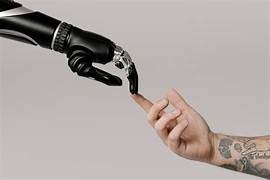
The Rise of AI Assistants: Are We Ready?
Exploring the rapid advancement of AI assistants, their transformative impact on daily life and industries, and the critical challenges we face—including privacy, ethics, bias, and workforce disruption—as society grapples with the technological, regulatory, and cultural readiness required to integrate these intelligent systems responsibly, ensuring they enhance human potential while safeguarding trust, fairness, and autonomy in an increasingly AI-driven world.
✨ Raghav Jain

Introduction
Artificial Intelligence (AI) assistants have transitioned from science fiction fantasy to ubiquitous tools embedded in our daily lives. From Siri and Alexa to Google Assistant and emerging AI models capable of complex reasoning, AI assistants are revolutionizing the way humans interact with technology. Their growing sophistication promises unprecedented convenience, efficiency, and accessibility across various domains including personal productivity, healthcare, education, customer service, and more. However, this rapid evolution also raises profound questions: Are we truly ready for this AI revolution? How prepared are we to integrate AI assistants responsibly into society, economy, and ethics? This article explores the rise of AI assistants, their capabilities, benefits, challenges, and the readiness of humanity to embrace this transformative technology.
The Evolution of AI Assistants
The journey of AI assistants began with simple rule-based chatbots and voice recognition systems. Early digital assistants were limited in understanding context, nuance, and natural language complexity. With the advent of machine learning, natural language processing (NLP), and deep learning, modern AI assistants have become capable of understanding human speech, learning user preferences, generating human-like conversations, and performing multi-step tasks.
Notable milestones include Apple’s Siri, launched in 2011, which brought voice-activated assistance to millions; Amazon’s Alexa, which popularized smart speakers and home automation; and Google Assistant, known for its robust integration with Google’s ecosystem and strong contextual understanding. Recent breakthroughs with large language models (LLMs) like OpenAI’s GPT series have propelled AI assistants into new realms, enabling more natural, flexible, and context-aware interactions.
Capabilities and Applications
AI assistants today can:
- Understand and respond to natural language: Leveraging NLP, AI can comprehend diverse accents, slang, and context to engage in conversations.
- Manage schedules and reminders: Helping users organize daily activities efficiently.
- Control smart devices: From thermostats to lights, AI assistants serve as the central hub for smart homes.
- Provide information and recommendations: From weather forecasts to restaurant suggestions and news summaries.
- Support customer service: Automating responses and handling queries in industries like banking, retail, and telecommunications.
- Assist in healthcare: Offering symptom checking, medication reminders, and even mental health support.
- Enable education and training: Personalized tutoring, language learning, and skill development.
- Drive productivity: Automating repetitive tasks, summarizing meetings, drafting emails, and coding assistance.
These capabilities illustrate the transformative potential AI assistants hold across personal and professional spheres.
The Benefits of AI Assistants
1. Enhanced Convenience
AI assistants can perform tasks hands-free and instantly, reducing the cognitive load on users. This convenience improves time management and allows people to focus on higher-value activities.
2. Accessibility
AI assistants enable access to information and services for people with disabilities, language barriers, or limited technical skills, promoting inclusivity.
3. Personalization
AI can learn from user behavior to provide tailored suggestions, improving user satisfaction and engagement.
4. Cost Efficiency
For businesses, AI assistants reduce the need for large customer service teams and streamline operations.
5. 24/7 Availability
Unlike human workers, AI assistants operate continuously without fatigue, improving service availability.
Challenges and Concerns
Despite the promising benefits, the rise of AI assistants introduces several challenges:
1. Privacy and Data Security
AI assistants require access to personal data to function effectively. This raises concerns about data collection, storage, and potential misuse. High-profile data breaches and surveillance fears exacerbate mistrust.
2. Bias and Fairness
AI models can inherit biases present in their training data, leading to unfair or discriminatory outcomes. This poses risks especially in sensitive areas like hiring, law enforcement, and healthcare.
3. Dependence and Overreliance
Heavy reliance on AI assistants may erode human skills such as memory, critical thinking, and social interaction. The psychological and societal impact of this dependence remains underexplored.
4. Job Displacement
Automation driven by AI assistants threatens to displace jobs in customer service, administration, and other sectors. While new roles will emerge, the transition could be socially disruptive.
5. Ethical and Legal Issues
Who is responsible when AI assistants make mistakes or cause harm? Legal frameworks lag behind technological advancements, creating regulatory uncertainty.
6. Misinformation and Manipulation
AI assistants might unintentionally spread misinformation or be exploited for malicious purposes such as propaganda, scams, or social engineering.
Are We Ready? Evaluating Human and Societal Readiness
Technological Readiness
Technologically, AI assistants have made giant strides. Advanced machine learning algorithms, cloud computing, and natural language processing have created systems that work remarkably well. Yet, challenges such as context understanding, emotional intelligence, and cross-cultural nuances persist.
Infrastructure and Access
The deployment of AI assistants depends on robust digital infrastructure and widespread internet access. While developed countries often have these in place, many developing regions still lack reliable connectivity and technological literacy.
Regulatory and Policy Frameworks
Governments and organizations are beginning to implement regulations around data privacy (e.g., GDPR), AI ethics, and accountability. However, global coordination is lacking, and many legal questions remain unresolved.
Public Awareness and Trust
User trust is critical for adoption. Awareness of privacy risks, bias, and misuse is rising, sometimes causing reluctance. Education on responsible AI use is essential to build confidence.
Ethical and Cultural Readiness
AI assistants challenge social norms and ethical boundaries. Societies need to engage in dialogue about acceptable AI behaviors, transparency, and human autonomy to shape these tools ethically.
Economic and Workforce Adaptation
Preparing the workforce through reskilling and education is vital to mitigate job displacement and harness AI as an augmentation rather than replacement tool.
Preparing for the AI Assistant Era
1. Strengthening Data Privacy and Security
Robust encryption, anonymization techniques, and transparent data policies can protect users. Companies must prioritize ethical data handling.
2. Addressing Bias
Diverse datasets, continuous monitoring, and inclusive AI development teams can reduce bias in AI assistants.
3. Promoting Digital Literacy
Education programs should empower users to understand AI capabilities and limitations, fostering informed interactions.
4. Developing Ethical AI Guidelines
Collaboration between policymakers, technologists, and ethicists can create frameworks ensuring responsible AI deployment.
5. Supporting Workforce Transition
Governments and businesses should invest in lifelong learning, digital skills training, and social safety nets.
6. Encouraging Transparent AI
AI systems should explain their decisions and allow user control to build trust and accountability.
The Future Outlook
AI assistants will continue to evolve, becoming more autonomous, intuitive, and integrated with human lives. Emerging trends include multimodal AI (combining speech, vision, and gesture), emotion recognition, proactive assistance anticipating user needs, and AI companionship for mental health and social connection.
The line between human and AI interaction will blur, creating ethical dilemmas and societal shifts. The question of readiness hinges on how proactively stakeholders prepare, regulate, and educate. Embracing AI assistants responsibly can unlock immense benefits, but neglecting risks can lead to unintended consequences.
The rise of AI assistants marks one of the most transformative technological shifts in recent history, fundamentally altering the way humans interact with machines, access information, and manage their daily lives, yet as these intelligent agents rapidly proliferate, from voice-activated personal assistants like Siri, Alexa, and Google Assistant to more advanced conversational AI models capable of understanding and generating human-like language, a critical question emerges: Are we truly ready to embrace this revolution? AI assistants, powered by breakthroughs in machine learning, natural language processing, and massive data availability, now offer unprecedented convenience, performing tasks ranging from simple reminders and calendar management to complex multi-step processes such as booking travel, handling customer service inquiries, and even providing emotional support, thereby promising to reshape productivity, accessibility, and the overall quality of life. On one hand, the benefits are undeniable—AI assistants provide a level of personalization and immediacy that was previously unimaginable, adapting to individual preferences, anticipating needs, and offering continuous 24/7 availability without fatigue or delay, effectively democratizing access to information and services for people of all ages, backgrounds, and abilities, including those with disabilities or limited technological literacy. These systems not only streamline personal routines but also drive significant efficiencies in business sectors by automating repetitive tasks, reducing operational costs, and enhancing customer engagement, thereby accelerating digital transformation across industries. However, the widespread adoption of AI assistants also exposes critical vulnerabilities and challenges that question our societal, ethical, and infrastructural preparedness. Privacy concerns are paramount, as these assistants require vast amounts of personal data to function optimally, raising fears about surveillance, data breaches, and unauthorized exploitation, especially when companies’ data policies lack transparency or adequate safeguards. Moreover, AI models have been found to perpetuate biases present in their training data, risking discriminatory behaviors and unfair outcomes that could reinforce social inequalities, particularly in sensitive domains such as hiring, healthcare, and law enforcement. There is also the psychological and cultural dimension of overreliance on AI assistants, where the convenience of outsourcing memory, decision-making, and social interaction to machines may erode fundamental human cognitive abilities, diminish interpersonal skills, and alter social norms, potentially leading to increased isolation or dependency. The labor market faces disruptions as well, with AI automation threatening to displace significant numbers of jobs, especially in customer service and administrative roles, raising urgent questions about workforce reskilling, economic inequality, and the social safety nets necessary to cushion these transitions. From a legal and ethical perspective, accountability remains a gray area—when AI assistants err or cause harm, determining liability is complex, exacerbated by the lack of comprehensive regulations tailored to AI technologies, leaving consumers vulnerable and companies potentially unaccountable. Furthermore, the proliferation of AI assistants invites new risks related to misinformation and manipulation, as malicious actors could exploit these tools to spread false information, manipulate opinions, or conduct sophisticated social engineering attacks, thus challenging the integrity of public discourse and security. Assessing readiness, technologically, AI assistants are advancing rapidly with improved contextual understanding, multi-modal inputs combining voice, text, and images, and more sophisticated dialogue capabilities, yet they still struggle with nuanced comprehension, emotional intelligence, and cultural sensitivity that human communication demands, signaling the need for ongoing innovation and refinement. Infrastructure-wise, while developed countries benefit from widespread internet connectivity and computational resources enabling smooth AI deployment, many parts of the world remain digitally underserved, creating a digital divide that risks exacerbating global inequalities in access to these transformative tools. On the regulatory front, although frameworks like the European Union’s GDPR and emerging AI ethics guidelines provide a starting point, global coordination is insufficient, and the pace of legislation struggles to keep up with technological developments, highlighting a gap that could lead to inconsistent standards, misuse, and erosion of trust. Equally important is public awareness and education; while curiosity and adoption rates grow, many users remain unaware of AI assistants’ limitations, data implications, and potential risks, underscoring the need for widespread digital literacy initiatives that empower users to interact safely and meaningfully with AI. Ethically and culturally, societies are only beginning to grapple with the profound questions AI assistants pose—about human autonomy, privacy, fairness, and the nature of social relationships in an age of machine intermediaries—requiring inclusive, ongoing dialogue involving technologists, policymakers, ethicists, and the public to shape norms and expectations that align AI use with human values. Economically, preparation involves not just technological innovation but also strategic investments in workforce development, including lifelong learning programs and support for sectors most affected by AI-driven automation, ensuring that AI becomes a complement to human skills rather than a wholesale replacement. Proactive measures such as enhancing transparency through explainable AI, instituting robust data protections, and fostering collaborative governance models between governments, industry, and civil society will be vital to mitigate risks and build resilient systems that maintain trust and accountability. Looking ahead, AI assistants will likely become even more integrated into daily life, evolving from reactive tools to proactive partners that anticipate needs, provide emotional companionship, and blend multimodal sensory inputs, thereby blurring the boundaries between human and machine interaction. This emerging future offers vast opportunities but also demands vigilant stewardship to avoid unintended consequences and ensure equitable benefits. Ultimately, the question of readiness is not merely about technical capacity but about society’s collective willingness to engage critically, ethically, and inclusively with AI assistants, establishing safeguards and fostering understanding to harness their potential responsibly. Only through this holistic approach can we ensure that the rise of AI assistants serves to enhance human capabilities, enrich lives, and uphold core values in an increasingly digital world.
The rise of AI assistants represents a monumental shift in the way humans engage with technology, transforming everyday interactions, workflows, and even societal structures in profound ways, as these intelligent agents—powered by advancements in artificial intelligence, machine learning, and natural language processing—evolve from simple voice-activated tools to sophisticated companions capable of understanding context, emotions, and complex tasks, raising the fundamental question of whether humanity is truly prepared to embrace this revolution responsibly and thoughtfully; on one hand, AI assistants like Siri, Alexa, Google Assistant, and emerging conversational models provide unparalleled convenience by managing schedules, answering queries instantaneously, controlling smart home devices, and streamlining workflows, thereby liberating individuals from mundane tasks and enabling more focus on creative and strategic activities, while also expanding accessibility to information and services for diverse populations, including people with disabilities, the elderly, and those unfamiliar with traditional computing interfaces, thus fostering inclusivity and democratizing digital experiences; these benefits extend beyond personal use to business applications where AI assistants optimize customer service through automation, reduce operational costs, and enable rapid scalability, illustrating their role as catalysts in the ongoing digital transformation; however, the rapid deployment of AI assistants also surfaces critical challenges and ethical dilemmas that question the societal readiness for such pervasive technology, foremost among these concerns is privacy, as AI assistants necessitate access to vast amounts of personal data to function effectively—ranging from location and habits to sensitive conversations—posing risks of data breaches, unauthorized surveillance, and misuse, which can erode user trust and invite regulatory scrutiny; additionally, AI systems often inherit biases embedded in their training data, leading to potential discrimination and unfair outcomes that disproportionately affect marginalized communities, a problem compounded by the opaque nature of many AI algorithms that complicates accountability and redress; furthermore, the psychological and cultural impacts of increasing dependence on AI assistants merit serious reflection, as overreliance on automated decision-making may diminish critical thinking, memory retention, and interpersonal skills, while subtly altering social norms and expectations around communication and privacy; the labor market also faces upheaval, with automation threatening jobs in customer support, administration, and beyond, raising urgent questions about workforce reskilling, economic inequality, and social safety nets to mitigate disruption; legally, the absence of clear frameworks addressing liability for AI errors or harms exacerbates uncertainty and potential misuse, while the potential for AI assistants to be exploited in spreading misinformation or conducting manipulative social engineering attacks poses new threats to information integrity and public safety; technologically, although AI assistants have achieved remarkable advances in natural language understanding, contextual awareness, and multi-modal interaction—combining speech, text, and vision—their comprehension of nuance, emotional intelligence, and cultural context remains imperfect, indicating that ongoing innovation and interdisciplinary research are essential to bridge these gaps; meanwhile, global infrastructure disparities highlight another layer of readiness, as many regions lack the reliable internet connectivity and computational resources required for seamless AI deployment, risking a widening digital divide; regulatory responses are emerging, with initiatives like the European Union’s GDPR and AI ethics guidelines laying groundwork for responsible development, yet a global, harmonized approach is still lacking, leaving potential loopholes and inconsistent protections; equally crucial is the role of public education and digital literacy, as users must be empowered to understand AI capabilities, limitations, and privacy implications to interact with these systems safely and effectively; ethical readiness also demands inclusive societal dialogue to determine acceptable AI behaviors, transparency standards, and mechanisms ensuring that AI augment human autonomy rather than undermine it; economically, proactive strategies are needed to prepare workforces through continuous learning and adaptation, ensuring that AI assistants complement rather than replace human skills, fostering an ecosystem where humans and AI collaborate symbiotically; transparency and explainability in AI systems will be vital to build trust, allowing users to grasp how decisions are made and to maintain control over their interactions; looking ahead, AI assistants are poised to become even more integrated, transitioning from reactive tools to proactive partners that anticipate needs, engage emotionally, and blend sensory inputs seamlessly, which holds promise to revolutionize education, healthcare, mental health support, and social connectivity; however, this future also necessitates vigilant stewardship to prevent misuse, bias reinforcement, privacy erosion, and social fragmentation; in conclusion, while the technology underpinning AI assistants is advancing rapidly, true readiness extends beyond technological capability to encompass ethical, legal, cultural, educational, and infrastructural preparedness, requiring coordinated efforts from governments, industry, academia, and civil society to ensure that the rise of AI assistants enhances human potential, respects fundamental rights, and contributes positively to society’s evolution in the digital age, making the question not just “Are we ready?” but “How will we choose to shape this future responsibly?”
Conclusion
The rise of AI assistants marks a pivotal moment in technological and social evolution. These intelligent systems offer remarkable capabilities that enhance convenience, accessibility, and productivity. However, their rapid adoption brings challenges around privacy, bias, ethics, and workforce impacts.
While the technology is advancing rapidly, true readiness involves not just technical sophistication but also regulatory frameworks, public trust, ethical considerations, and social adaptation. Governments, industries, educators, and users must collaboratively navigate this complex landscape to harness AI assistants for the greater good.
In conclusion, we are on the cusp of an AI assistant revolution. Whether society is ready depends on deliberate preparation, inclusive policymaking, and continuous dialogue to ensure AI serves humanity equitably and responsibly.
Q&A Section
Q1: What are AI assistants and how do they work?
Ans: AI assistants are software agents that use artificial intelligence techniques like natural language processing and machine learning to understand human input and perform tasks such as answering questions, managing schedules, and controlling smart devices.
Q2: What are the main benefits of AI assistants?
Ans: They provide enhanced convenience, accessibility for diverse users, personalized experiences, cost savings for businesses, and 24/7 availability.
Q3: What privacy concerns arise with AI assistants?
Ans: AI assistants collect and process personal data, raising risks of data breaches, unauthorized surveillance, and misuse of sensitive information.
Q4: How can AI assistants be biased?
Ans: Bias occurs when AI models are trained on unrepresentative or prejudiced data, leading to unfair treatment of certain groups or inaccurate outcomes.
Q5: Are AI assistants going to replace human jobs?
Ans: AI assistants may automate some tasks, potentially displacing jobs, but they can also create new roles focused on AI management, oversight, and complementary skills.
Similar Articles
Find more relatable content in similar Articles

Data Centers and the Planet: M..
As cloud computing becomes the.. Read More

Digital DNA: The Ethics of Gen..
Digital DNA—the digitization a.. Read More

Wearable Health Sensors: The D..
Wearable health sensors are re.. Read More

Protecting Kids in the Digital..
In an increasingly connected w.. Read More
Explore Other Categories
Explore many different categories of articles ranging from Gadgets to Security
Smart Devices, Gear & Innovations
Discover in-depth reviews, hands-on experiences, and expert insights on the newest gadgets—from smartphones to smartwatches, headphones, wearables, and everything in between. Stay ahead with the latest in tech gear
Apps That Power Your World
Explore essential mobile and desktop applications across all platforms. From productivity boosters to creative tools, we cover updates, recommendations, and how-tos to make your digital life easier and more efficient.
Tomorrow's Technology, Today's Insights
Dive into the world of emerging technologies, AI breakthroughs, space tech, robotics, and innovations shaping the future. Stay informed on what's next in the evolution of science and technology.
Protecting You in a Digital Age
Learn how to secure your data, protect your privacy, and understand the latest in online threats. We break down complex cybersecurity topics into practical advice for everyday users and professionals alike.
© 2025 Copyrights by rTechnology. All Rights Reserved.